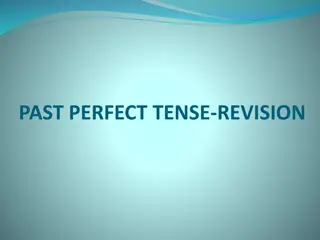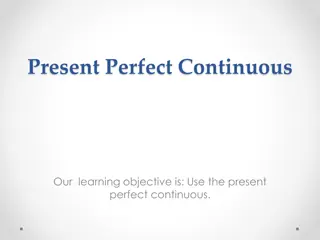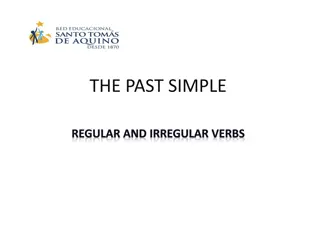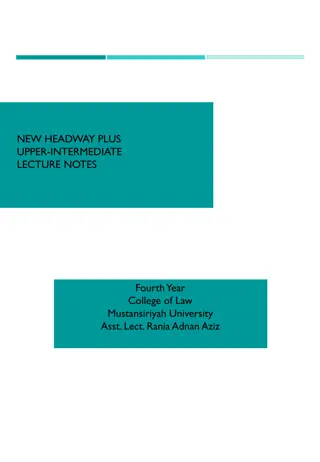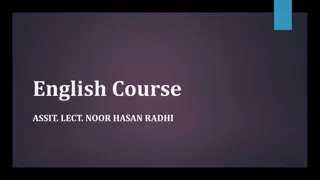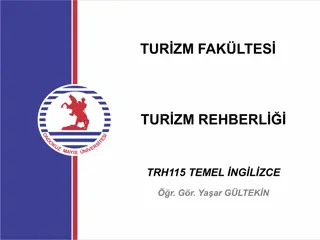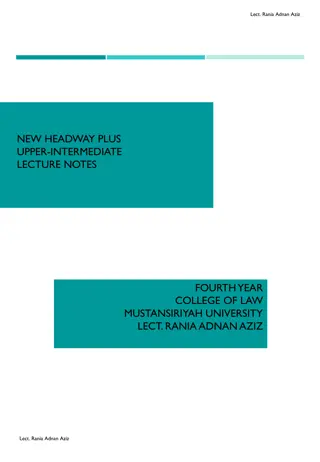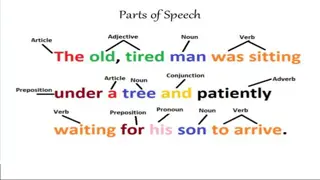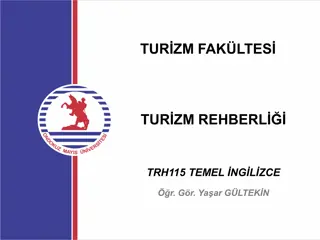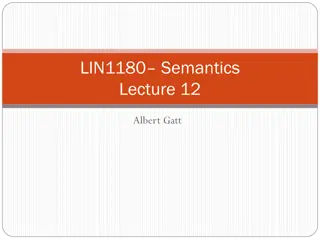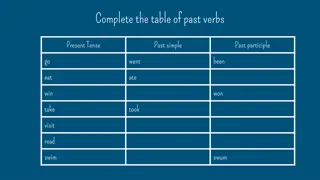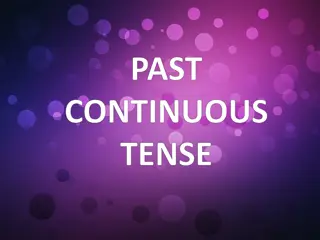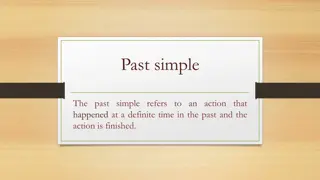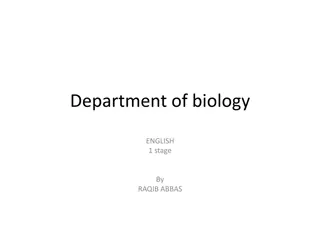
Understanding Past Perfect Continuous Tense
Learn about the past perfect continuous tense in English grammar, its definition, usage, and examples. Discover the formula, characteristics, and functions of this verb tense, along with adverb time indicators and sample sentences. Improve your understanding of how to construct and use past perfect continuous tense correctly.
Download Presentation

Please find below an Image/Link to download the presentation.
The content on the website is provided AS IS for your information and personal use only. It may not be sold, licensed, or shared on other websites without obtaining consent from the author. If you encounter any issues during the download, it is possible that the publisher has removed the file from their server.
You are allowed to download the files provided on this website for personal or commercial use, subject to the condition that they are used lawfully. All files are the property of their respective owners.
The content on the website is provided AS IS for your information and personal use only. It may not be sold, licensed, or shared on other websites without obtaining consent from the author.
E N D
Presentation Transcript
BASIC ENGLISH CONVERSATION PAST PERFECT CONTINUOUS ACTIVE TENSE DRA. AGUSTINA MASSORA, MM
Past perfect continuous (past pefect progressive tense): Terjadi di suatu waktu di masa lalu, kejadian tersebut terus berlanjut sampai selesai pada suatu titik dan aksi lain terjadi atau meruju pada aksi yang sedang berlangsung sampai suatu waktu tertentu di masa lampu. Menurut kamus oxford leaner s dictionary bahwa; past ferfect continuous tense adalah: Menggambarkan sebuah aksi atau situasi yang berlangsung untuk periode waktu sebelum aksi atau situasi lain dimasa lalu. Menurut kamus Cambridge dictionary bahwa: beberapa aksi atau peristiwa yang mulai sebelum titik tertentu dimasa lalu dan masih berlangsung sampai waktu itu di tentukan. Intinya adalah: Menceritakan aktivitas orang,peristiwa,Tindakan,kejadian atau aksi yang sedang berlangsung dalam sebuah periode waktu di masa lalu, sebelum, aksi, peristiwa atau kejadian lain di masa lalu. KESIMPULAN: Digunakan untuk menunjukkan durasi dari suatu aksi yang sedang berlangsung dimasa lalu sebelum aksi lain terjadi. DRA. AGUSTINA MASSORA, MM
PAST PERFECT CONTINUOUS TENSE VERB
Kita tidak terlalu banyak mengunakan past perfect continuous dalam bahasa inggris se hari2, tetapi kita harus juga mengerti bentuk tense ini yaitu: rumus, ciri2,fungsi serta cara pengguaannya. pengertian past perfect continuous adalah bentuk kalimat atau ungkapan yang menerangkan suatu perbuatan yang sedang di lakukan pada waktu lampau,atau menjelaskan dua peristiwa yang telah terjadi, tetapi menegaskan peristiwa mana yang sedang lebih dulu terjadi kemudian datang kejadian berikutnya tapi sama sama terjadi di masa lampau. Fungsinya: Menggambarkan kejadian yang berlangsung di masa lalu dan berakhir di masa lalu. Ciri-cirinya adalah: - Menekankan durasi atau lamanya suatu aktivitas - Tidak ada hubungannya dengan masa kini - Digunakan dalam narasi cerita - Digunakan dalam teks report,recount, dan narrative. Formula ( Rumus) Active verb (+) subject pronoun ( they,we, i, you,he, she, it ) + had + been verb1 + ing + (adjective) + noun (object) +usual ( profession noun) + plural/singular + preposition + adverb place + adverb time. (+?) Had + subject pronoun ( they, we, i, you, he, she, it ) + been + verb1 + ing( adjective) + noun usual ( profession noun ) + plural/singular + preposition + adverb place + adverb time. (-) subject pronoun ( they, we, i, you,he, she, it ) + hadn t + been + verb1 + ing+( adjective) + noun usual (profession noun) + plural/sngular preposition + adverb place + adverb time. (-?) Hadn t ) + subject pronoun ( they, we, i, he, she, it ) + bee + verb1 + ( adjective) + noun usual ( profession noun ) + plural/singular + preposition + adverb place + adverb time. DRA. AGUSTINA MASSORA, MM
Example: ( + ) I had been buying the new cars in Jakarta for 2hours before my friend came over. ( Saya sudah membeli mobil mobil itu sebelum teman aku datang) (+?) Had you been buying the cars in Jakarta for 2 hours before your friend came over? (-) I hadn t been working at the companyfor 4 years before I got promoted (-?) Hadn t you been working at the company for 4 years before you got promoted ADVERB TIME: - FOR - Since - The whole day - -All day - - before - when DRA. AGUSTINA MASSORA, MM
II. (+) A. B. A. Pardon me/sorry? B. I had been eating (-) A. Who had been drinking B. I A. Pardon me/sorry? B. I hadn t been drinking A. Why? B. I hadn t been drinking, but I had been eating WHO? # INTERESTING FAST ENGLISH SPEAKING TECHNIQUES* Who had been eating? I 1. Yes/No. Question A . Excuse me? B. Yes. Please A. May I ask you about something? B. Sure/please/go ahead A. Thanks A. Thanks B.. You re welcome (+) A. Had you been eating? B. Yes, I had A. Pardon me/sorry? B. I had been eating III. (+) A. B. A. Pardon me/sorry? B. I had been eating delicious (-) A. So..what had you been drinking? B. Sweet drink A. Pardon me/sorry? B. I had been drinking sweet drink A. Why? B. I hadn t been drinking sweet drink, but I had been eating delicious foods. WHAT? What had you been eating? Delicious foods (-) A. So..Hadn t you been drinking? B. No, I hadn t A. Pardon me/sorry? B. I hadn t been drinking A. Why? B. I hadn t been drinking but I had been eating DRA. AGUSTINA MASSORA, MM
IV. (+) WHERE? V. (+) A. B. A. B. (-) A. B. A. Pardon me/sorry? B. I hadn t been drinking sweet drink at home A. Why? B. I hadn t been drinking sweet drink at home, but I had been eating delicious foods in the Restaurant. WHICH? Which had you been eating in the Restaurant? Delicious foods Pardon me/sorry? I had been eating delicious foods in the Restaurant. A. B. A. Pardon me/sorry? B. I had been eating delicious foods in the Restaurant. (-) A. So..Where hadn t you been drinking sweet drink? B. A home. A. Pardon me/sorry? B. I hadn t been drinking sweet drink at home. A. Why? B. I hadn t been drinking sweet drink at home, but I had been eating delicious foods in the Restaurant. Where had you been eating delicious foods? In the Restaurant. Which hadn t you been drinking at home? Sweet drink DRA. AGUSTINA MASSORA, MM
VI. (+) A. WHEN? When had you been eating delicious foods in the Restaurant? For an hour A. Pardon me/sorry? B. I had been eating delicious foods in the Restaurant since yesterday. (-) A. When hadn t you been drinking sweet drink at home? B. for . A. Pardon me/sorry? B. I hadn t been drinking sweet drink at home whole day A. Why? B. I hadn t been drinking sweet drink at home for 30 minutes, because I had been eating delicious foods in the Restaurant for an hour before My friends came B. DRA. AGUSTINA MASSORA, MM
INTERESTING FAST ENGLISH SPEAKING TECHNIQUE I. (+) A. B. A. (-) A. B. A. Pardon me/sorry? B. I hadn t been being lazy. A. Why? B. I hadn t been being lazy, but I had been being diligent. Yes/No.Question. ACTIVE NON VERB Had you been being diligent? Yes. I had. Pardon me/sorry? FORMULA: ( RUMUS) (+) SPRO+HAD BEEN BEING+ADJECTIVE+USUAL/PROFESION NOUN+PRPO+ADVERB PLACE+ADVERB TIME (?) HAD+SPRO+BEEN BEING+ADJECTIVE+USUAL/PROFESSION NOUN+PREPO+ADVERB PLACE+ADVERB TIME (-) SPRO+HADN T BEEN BEING+ADJECTIVE+USUAL/PROFESSION NOUN+PREPO+ADVERB PLACE+ADVERB+TIME (?-) HADN T + SPRO+ BEEN BEING+ADJECTIVE+USUAL/PROFESSION NOUN+PREPO+ADVERB PLACE+ADVERB TIME So..hadn t you been being lazy? No, I hadn t II. (+) A. B. A. B. I had been being diligent. (-) A. So, Who hadn t been being lazy? B. I A. Pardon me/sorry? B. I hadn t been being lazy. A. Why? B. I hadn t been being lazy, but I had been being diligent. WHO? Who had been being diligent? I Pardon me/sorry. EXAMPLE: (+) I Had been being a diligent lecturer in the campus whole day (?) Had you been being a diligent lecturer in the campus whole day? (-) I hadn t been being a lazy woman at home since last morning. (?-) Hadn t you been being a lazy woman at home? DRA. AGUSTINA MASSORA, MM
III. WHERE? IV. (+) A. B. A. B. (-) A. B. Since Yesterday. A. Pardon me/sorry B. I hadn t been being lazy at since yesterday A. Why? B. I hadn t been being lazy at home since last morning, because I had been being diligent in the campus whole day, When my friend was busy WHEN? (+) A. B. A. B. (-) A. B. A. B. A. B. When had you been being diligent in the campus? Whole day. Pardon me/sorry? I had been being diligent in campus whole day. Where had you been being diligent? In the campus Pardon me/sorry? I had been being diligent. So, When had you been being lazy? So, Where had you been being lazy? At home Pardon me/sorry? I hadn t been being lazy at home. Why? I hadn t been being lazy at home, but I had been being diligent in the campus. DRA. AGUSTINA MASSORA, MM
THANK YOU DRA. AGUSTINA MASSORA, MM




